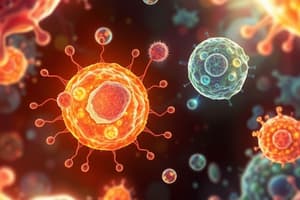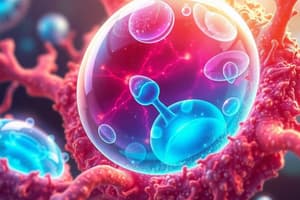Podcast
Questions and Answers
What is the primary role of natural selection in evolution?
What is the primary role of natural selection in evolution?
- To eliminate all undesirable traits in an organism
- To create new species on demand
- To limit the diversity of organisms in an environment
- To enhance traits that improve survival and reproduction (correct)
Which process describes the emergence of new species due to geographic isolation?
Which process describes the emergence of new species due to geographic isolation?
- Speciation (correct)
- Natural selection
- Adaptation
- Hybridization
Which physiological mechanism is fundamental for maintaining internal balance in an organism?
Which physiological mechanism is fundamental for maintaining internal balance in an organism?
- Reproductive isolation
- Environmental adaptation
- Homeostasis (correct)
- Genetic variation
What provides evidence of evolutionary trends and relationships among species?
What provides evidence of evolutionary trends and relationships among species?
What roles do the nervous and endocrine systems play in an organism?
What roles do the nervous and endocrine systems play in an organism?
What is the primary role of genes in living organisms?
What is the primary role of genes in living organisms?
Which type of cell contains a nucleus?
Which type of cell contains a nucleus?
What is a critical consequence of losing biodiversity in ecosystems?
What is a critical consequence of losing biodiversity in ecosystems?
Which process is vital for maintaining cellular integrity?
Which process is vital for maintaining cellular integrity?
Which statement best defines evolution?
Which statement best defines evolution?
Which of the following is NOT a key process within cells?
Which of the following is NOT a key process within cells?
How do genetic variations affect evolution?
How do genetic variations affect evolution?
Which of the following best describes ecology?
Which of the following best describes ecology?
Flashcards
Natural Selection
Natural Selection
The process where traits helping survival and reproduction are favored in an environment.
Adaptation
Adaptation
An organism's trait change helping it live in its environment.
Physiology
Physiology
The study of how living things work.
Homeostasis
Homeostasis
Signup and view all the flashcards
Speciation
Speciation
Signup and view all the flashcards
What is Biology?
What is Biology?
Signup and view all the flashcards
What are cells?
What are cells?
Signup and view all the flashcards
What is Genetics?
What is Genetics?
Signup and view all the flashcards
What is DNA?
What is DNA?
Signup and view all the flashcards
What is Ecology?
What is Ecology?
Signup and view all the flashcards
What is Evolution?
What is Evolution?
Signup and view all the flashcards
What are Ecosystems?
What are Ecosystems?
Signup and view all the flashcards
What is Biodiversity?
What is Biodiversity?
Signup and view all the flashcards
Study Notes
Biology
- Biology is the study of life in all its forms, encompassing a vast range of topics from the smallest molecules to the largest ecosystems.
- It encompasses diverse disciplines like cell biology, genetics, ecology, evolutionary biology, and physiology, each focusing on specific aspects of living organisms.
- Fundamental concepts in biology include cells as the basic units of life, the flow of energy and matter through ecosystems, the mechanisms of heredity, and the adaptations of organisms to their environments.
Cell Biology
- Cell biology examines the structure, function, and behavior of cells.
- Cells are the fundamental units of life, and their components (organelles) perform specific functions.
- Key processes within cells include cell division, energy production, protein synthesis, and information transfer, allowing for cell growth, repair, and reproduction.
- Prokaryotic cells (lacking a nucleus) and eukaryotic cells (containing a nucleus) represent major cell types.
- Membrane transport is vital in maintaining cellular integrity and necessary for cellular function.
Genetics
- Genetics focuses on heredity, the transmission of traits from parents to offspring.
- Genes, segments of DNA, carry the genetic information responsible for inherited characteristics.
- DNA (deoxyribonucleic acid) is the fundamental genetic material, a double helix structure ensuring the replication of genetic information.
- Genetic variations and mutations can cause changes in inherited traits, which drive evolution.
- Techniques like PCR (polymerase chain reaction) for amplifying DNA and gene editing tools like CRISPR can manipulate genetic material.
Ecology
- Ecology investigates the relationships between organisms and their environment, and the factors regulating the distribution and abundance of species.
- Biotic factors (living components) and abiotic factors (non-living components) shape ecological systems.
- Ecosystems are communities of organisms interacting within a shared physical environment.
- Key ecological concepts include population dynamics, community interactions, and ecosystem processes such as nutrient cycling.
- Biodiversity is a critical component of ecology, and its loss can disrupt ecological balance.
Evolution
- Evolution is the change in heritable characteristics of biological populations over successive generations.
- Natural selection is a key mechanism driving evolution, favoring traits which enhance survival and reproduction in a given environment.
- Adaptation is an organism's evolutionary adjustment to its environment, reflecting natural selection's impact.
- Speciation is the process by which new species arise from existing ones, often due to geographic isolation or other factors.
- Fossil records and comparative anatomy provide evidence of evolutionary trends and relationships.
Physiology
- Physiology studies the function of organisms at the molecular, cellular, tissue, organ, and system levels.
- Mechanisms like maintaining homeostasis (internal balance) are fundamental in physiological processes.
- Respiration, digestion, circulation, and excretion are examples of crucial physiological processes for maintaining life.
- The nervous and endocrine systems coordinate various bodily functions within an organism, using communication between cells and systems.
- Response to stimuli (e.g. environmental changes, pathogens) is central to physiological processes.
Studying That Suits You
Use AI to generate personalized quizzes and flashcards to suit your learning preferences.




